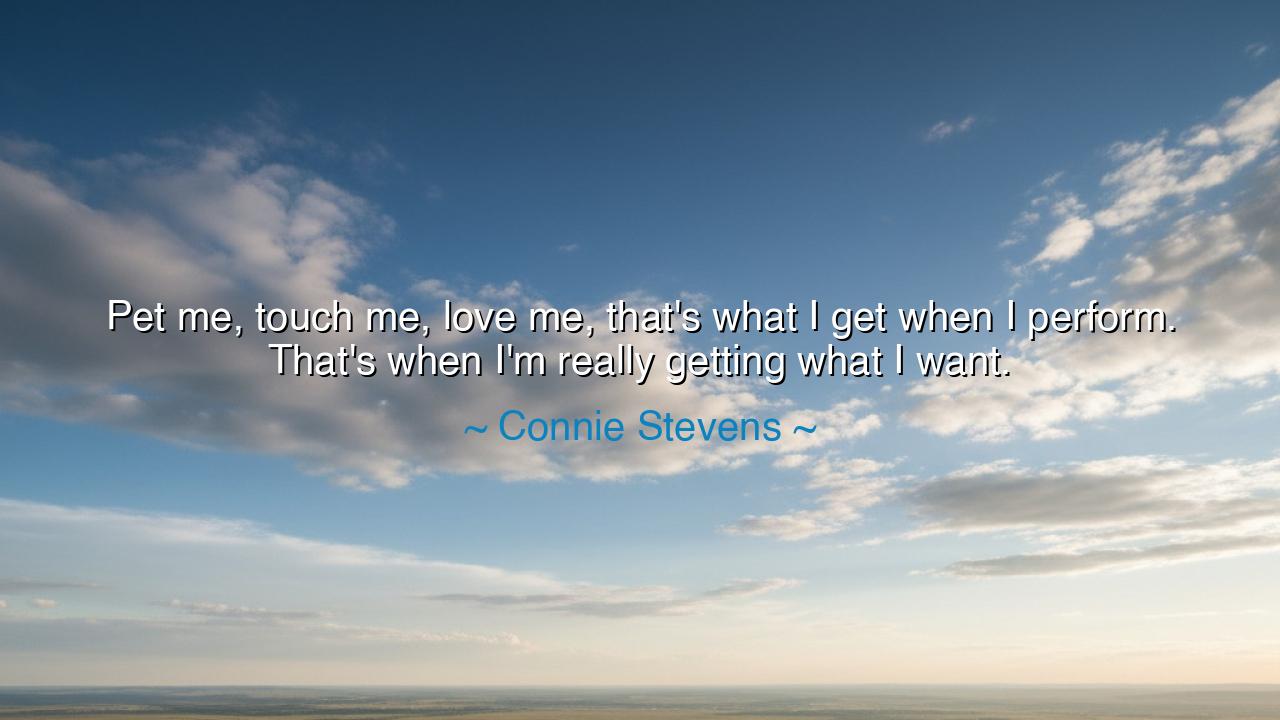
Pet me, touch me, love me, that's what I get when I perform.
Pet me, touch me, love me, that's what I get when I perform. That's when I'm really getting what I want.






The actress and singer Connie Stevens, who lived her life upon the stage and beneath the lights, once spoke with disarming honesty: “Pet me, touch me, love me, that's what I get when I perform. That's when I'm really getting what I want.” At first, her words appear playful, even indulgent. Yet when examined more deeply, they reveal an ancient truth about the human spirit—the longing for love, the yearning for touch, the hunger for connection that lies at the heart of every act of performance. For the stage is not only a place of art, but also of communion between souls.
When she says, “Pet me, touch me, love me,” it is not vanity but vulnerability. It is the admission that behind the performance lies a childlike need for affection, for validation, for warmth. The performer pours herself out, offering voice, body, and spirit. In return, she longs not for money or power, but for recognition that she is seen, cherished, and loved. This is not weakness, but the essence of humanity. From kings to beggars, from prophets to poets, all seek the same: to be acknowledged, embraced, and valued by others.
The phrase, “That’s when I’m really getting what I want,” is not a confession of greed, but of fulfillment. For many who walk the earth toil without ever touching the heart of another. But the performer, standing before an audience, feels the current of love flowing back upon her, as waves returning to the shore. It is in this exchange that she finds her true purpose. The ancients might say that this is the echo of the divine within art—that the artist creates not only for themselves, but as a bridge of love between souls.
History too gives us this truth. Think of Sarah Bernhardt, the great French actress of the nineteenth century, who captivated audiences across continents. Her performances were not simply admired—they were adored. She was showered with roses, embraced by crowds, worshipped almost as a goddess. What sustained her through decades of performance was not only her craft, but the love she received in return, love that filled the void every human heart carries. In her story, as in Stevens’, we see that art and affection are forever intertwined.
The origin of such longing lies in the ancient role of performance itself. In the earliest days, bards and singers carried not only stories but also healing. Their songs united tribes, their words gave comfort, their dances stirred joy. The applause of the people was not merely appreciation—it was the tribe’s way of saying, “We are with you, we need you, we love you.” Stevens’ words remind us that even in modern times, the performer’s deepest reward is still the same as in the fire-lit circles of old: love freely given, love fully received.
The lesson is profound: every soul craves to be loved, but not all are willing to admit it. Stevens teaches us that there is no shame in longing for love; it is the most human of desires. What matters is not the craving itself, but what we do with it. If we, like the performer, use our gifts to create beauty, to share ourselves, to inspire and uplift, then the love that returns to us is pure and deserved. But if we grasp for love through deceit, vanity, or domination, then we distort what should be sacred.
Practical actions arise from this truth. Do not be afraid to admit your need for love. Express it not by demanding, but by giving. Share your gifts, however humble they may be, whether in art, in service, or in simple kindness. And when love returns to you, receive it with gratitude, not with arrogance. For love, once given freely, is the greatest reward life can offer. In your own way, you too can “perform”—not upon a stage of wood and lights, but upon the stage of life itself, where each act of sincerity invites affection.
Thus the words of Connie Stevens endure: “That’s when I’m really getting what I want.” Future generations, let this be remembered: the heart’s deepest hunger is not for gold, not for power, not even for glory—it is for love. To give it and to receive it is the true performance of life. And those who live by this truth shall never hunger in spirit, for they will always find themselves embraced, touched, and loved, even beyond the walls of the stage.






AAdministratorAdministrator
Welcome, honored guests. Please leave a comment, we will respond soon